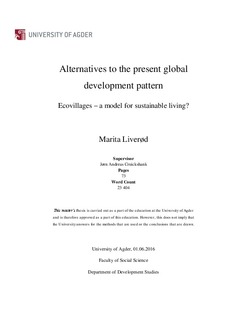| dc.description.abstract | The current way of development is exhausting the planets limitations, the continues increase in consumption are degrading the nature that is relied on for human existence. Thus, it is necessary to define an alternative way of developing. The aim is to achieve happiness for all, sustaining the resources of the planet. Ecovillages are recognized as a sustainable alternative which encompasses a holistic approach to the term sustainability. Through qualitative research in the form of participatory observations, interviews and a survey performed in Gambhira, an ecovillage in rural Colombia, the sustainability, educational mission as a model for change and progress will be investigated. Analysing the dimension of GEN and Litfin; Ecology, economy, community/social and consciousness/culture expose different significance in the various aspects, revealing the idea of nature as building block in the perception of reality.
Receiving volunteers from all corners of the world, Gambhira is compatible with Dewey’s theory of learning by doing; exchanging knowledge and the experience of ecovillage life, revealing the importance of sharing; community living, offering ancestral knowledge of the interconnectedness between all living entities and nature. Challenging the understanding of the path to achieve happiness, practicing a simple life, focusing on educational activities. Gambhira is varying in degree of success but offers another way of comprehending nature and how to live. In spite of the limitations and challenges, Gambhira demonstrates a model to learn from when searching for alternatives in a world where values have altered with increasing individualization and modernization affecting the definition of development. Redefining goals and rediscovering the path to reach them, Gambhira, among other ecovillages can be one part of the solution. | nb_NO |
